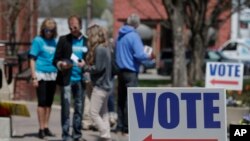Eight U.S. states and Washington, D.C., are holding Democratic and Republican Party primaries on Tuesday.
Four of the primaries had been scheduled weeks ago but were delayed because of fears of the coronavirus pandemic.
The voting involves picking nominees for seats in the Senate and House of Representatives in the November 3 national election.
But the day's voting could also officially hand former Vice President Joe Biden the Democratic Party's presidential nomination to face President Donald Trump in November.
Biden, who served two terms as second in command to former President Barack Obama, is already the presumptive nominee, with more than 20 other candidates having dropped out of the Democratic nomination race.
Vermont Sen. Bernie Sanders, the last of Biden's vanquished foes, remains on ballots and could pick up more delegates to the party's national convention in August. Depending on how many delegates Sanders wins, it could be enough to prevent Biden from numerically clinching the presidential nomination ahead of other state primaries in June and into July.
Biden needs 425 more delegates to secure the 1,991 majority of convention delegates needed to win the nomination, with 479 at stake in the Tuesday voting.
Voters are headed to polling places or voting by mail in Indiana, Maryland, Pennsylvania, Rhode Island and Idaho, all of which postponed their original voting dates because of the coronavirus threat. Other regularly scheduled votes are set in the states of Iowa, Montana, New Mexico and South Dakota, along with the vote in the city of Washington.
The elections are occurring as the U.S. is engulfed in days of protests over the death last week of a black man while in police custody in Minneapolis, Minnesota, along with the limited reopening of businesses throughout the country that were closed because of the coronavirus threat.
As a result, voter turnout could be lower than usual, although mail-in balloting has boosted voter participation in some states during the pandemic.
Key races
In the Eastern state of Maryland, Democratic Congressman Kweisi Mfume took over the late Congressman Elijah Cummings' seat several weeks ago in a special election. But he faces several opponents in a party primary for the nomination to a full two-year term, including Cummings' widow, Maya Rockeymoore Cummings.
In the Western state of Montana, Sen. Steve Daines, the Republican incumbent, is heavily favored in a party primary. A likely victory for Daines would set up a key November Senate contest against Gov. Steve Bullock, who unsuccessfully sought the Democratic presidential nomination and is also favored in his Senate primary contest.
Republicans now narrowly control the Senate, but a prospective Daines-Bullock contest in the November election would be one of the key races determining Senate control starting next January.
A Senate Republican primary is set in the Western state of New Mexico, with several contested congressional primaries scheduled in the Eastern state of Pennsylvania and four contested House primaries in the Midwestern state of Iowa.





